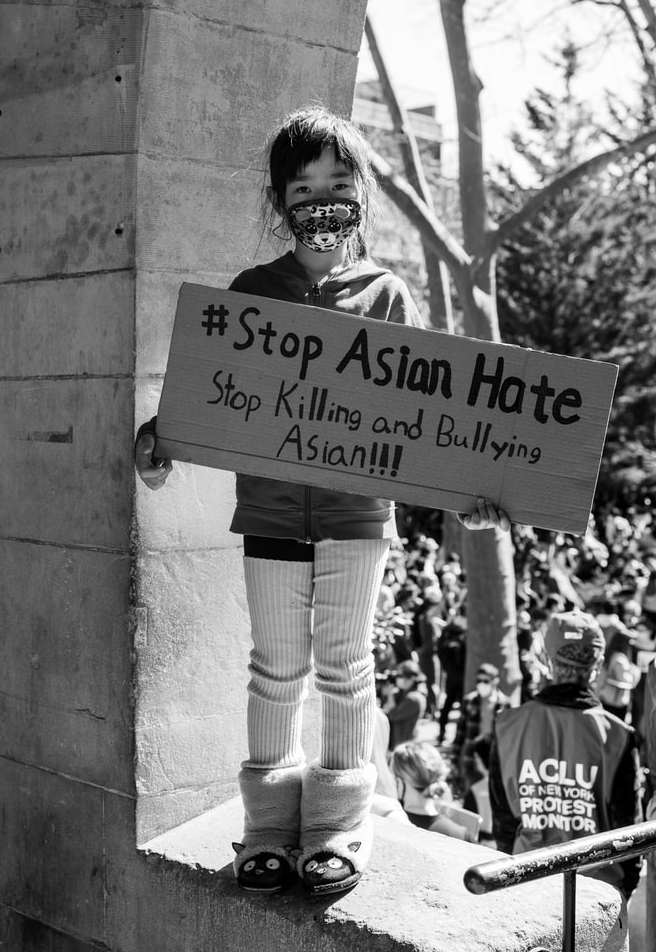How to Talk About Anti-Asian Racism with Your Kids

Over the past year, since the start of the COVID-19 virus, there has been a rise in anti-Asian racism and discrimination. These acts of hate can be difficult, yet necessary, topics to approach with your children and other family members.
Having these conversations can be daunting as a parent but ignoring that these events are happening, especially if you or your child is of Asian descent or is acting out against others of Asian descent, is giving the message that these actions are ok. In this post, we will share tips to guide you in having this conversation and offer some do’s and don’ts when it comes to supporting those in our Asian communities.
The purpose of having these conversations with our loved ones is to explain why anti-Asian racism, or any racism/act of hate, is wrong and how the coronavirus is being used as a scapegoat. The ultimate goal is to change your loved one’s perspective and gain awareness so you and they are not complacent in racist behavior.
Here are some tips to get you started:
1.) Practice what you want to say before you say it.
These conversations can bring up fears, insecurities, and discomfort for us, as the adult. So, it is crucial that you enter these conversations prepared. Write it down, rehearse it in front of a mirror, or have the conversation with another adult first so you have a plan of what you will say to get things started. Also, try to think up some of the questions your child might ask and have some answers prepared.
2.) Be aware of your own biases.
When having these conversations it is so important that we, as parents, keep any biases in check. We are telling and showing our children how wrong racism and acts of hate are. We must be aware that we are not displaying any discrimination ourselves. So much more than what we say is what we do and how that is witnessed by our children. Be the example.

3.) Use picture books.
Books can be a huge help when it comes to speaking with your child about racism. Look at some of the books your child is currently reading and the characters in them. If they all look the same then ask your child what they think of everyone looking the same. If they are more diverse then ask your child which character they would want to be friends with. The goal here is to see what your child already knows so you can have a starting point. There are also books specifically written to address acts of racism, bullying, and discrimination. Consider picking up one of those and using it as a stepping-off point for your conversation.
4.) Ask your child how they are feeling.
It is not enough just to talk to your child. It is important to gauge your child’s feelings. They might not have found it easy to tell you they were worried or scared before this. If they do tell you they are fearful for themselves explain how you will help them. If they are fearful for you, explain the safety steps you are taking to protect yourself. Your child just wants to feel safe and secure.
5.) Teach your child to embrace differences.
How boring would it be if we all looked the same? Had the same background? Spoke the same language? Had the same traditions? Etc. Teach your child to love and embrace what is different about them and to be excited about learning about others.
After you have had the hard conversation you may want to consider ways to support your Asian communities during this challenging time.
What are the dos and don’ts of supporting those impacted by racism?
Do be authentic. The last thing people need is fake empathy. They need true reflection and authenticity. Share your feelings of shame, fear, outrage, or whatever else you are feeling about what is happening. Then genuinely ask what you can do, how you can help them, ask them how they are feeling, how they are coping. Having these conversations, if you can be authentic, is better than not having them at all.
Don’t avoid the topic. Ignoring that racism is happening is being complacent in it. Speak up. Acknowledge that these actions are not right. These conversations are uncomfortable because they are extremely emotional and personal but just because you are afraid of them doesn’t mean you shouldn’t have them.
Don’t be defensive. These conversations can often get political or challenge your world views, veering away from being emphatic and compassionate. If that starts to happen be careful to not get defensive and exit the conversation before it goes south.

Do offer support. Consider donating to victim relief funds or bringing a meal to a victim in need. If a person feels more comfortable traveling in groups, you may consider being a walking/running, or driving partner or if they are fearful of leaving their home, consider picking up groceries for them, etc.
Do give them space and understand if they don’t want to talk. Many people in these communities may be too angry to talk, they might need the space to be mad and grieve in their own way. Understand that and don’t push.
Do teach your children and family how to be a good ally. Teach right and wrong. Have the hard conversations.
Don’t generalize. There can be a tendency to make broad statements about a particular race or group in crisis but there is diversity within groups. This diversity should be recognized. Don’t assume “all” or “everyone” feels the same.
Do take action. This includes doing your research. Learning about history and sharing what you have learned. Make changes in your personal life to be more inclusive, maybe that means within your workplace or being aware of your own biases. Every small positive change is worth something.
There is no doubt this is all extremely emotional, personal, and thus challenging to approach but together we can make small changes to be more inclusive and to show others we will not stand for this behavior.
If you are struggling emotionally we are here for you. Our counselors work with clients from all walks of life to learn healthy coping, communication skills, and how to find peace.
Ready to begin counseling in Pennsylvania?
Counselors at CW Psychological Services are professionally-trained and licensed. We have openings for online, or telehealth, therapy appointments. Email us at [email protected] or call at (610) 308-7575.
